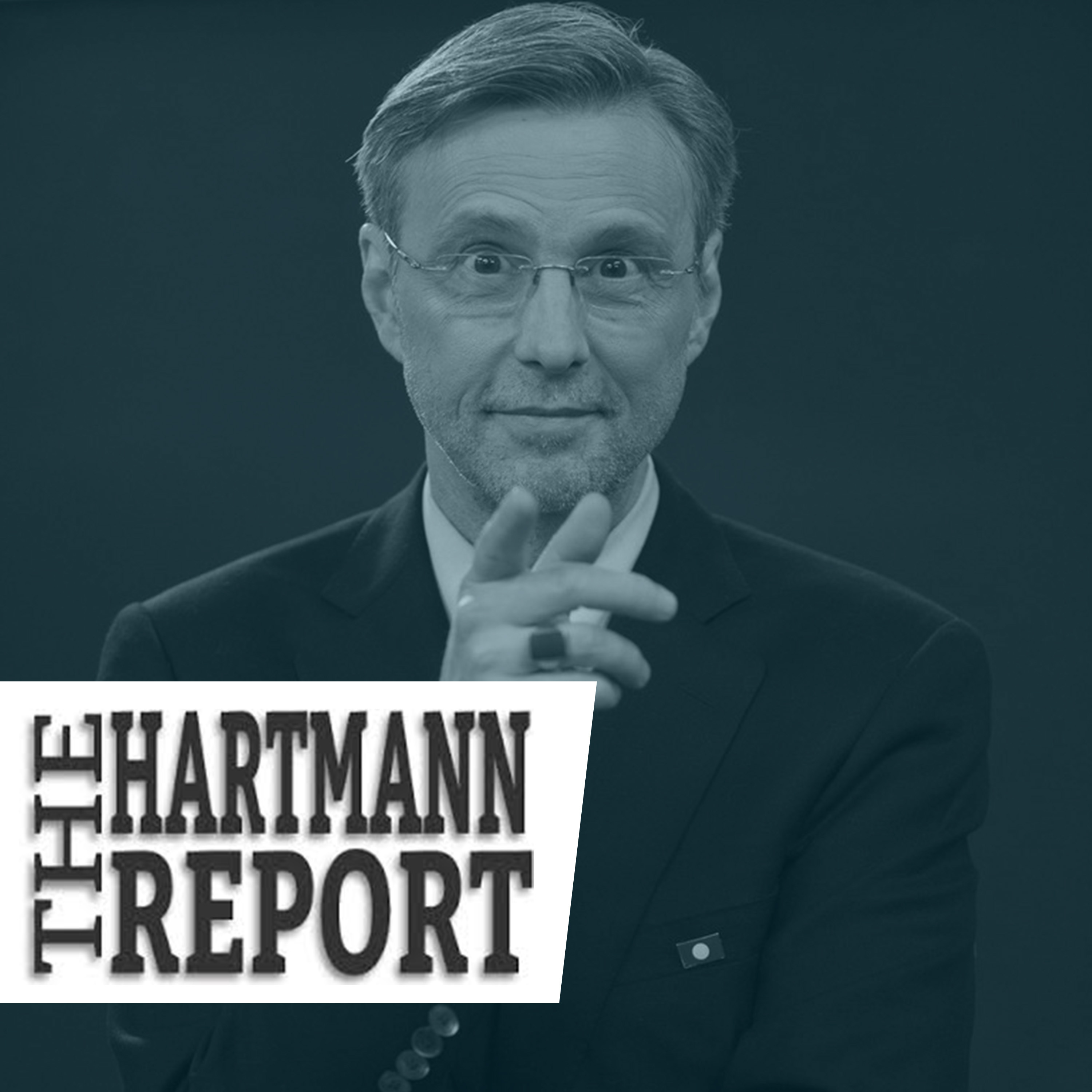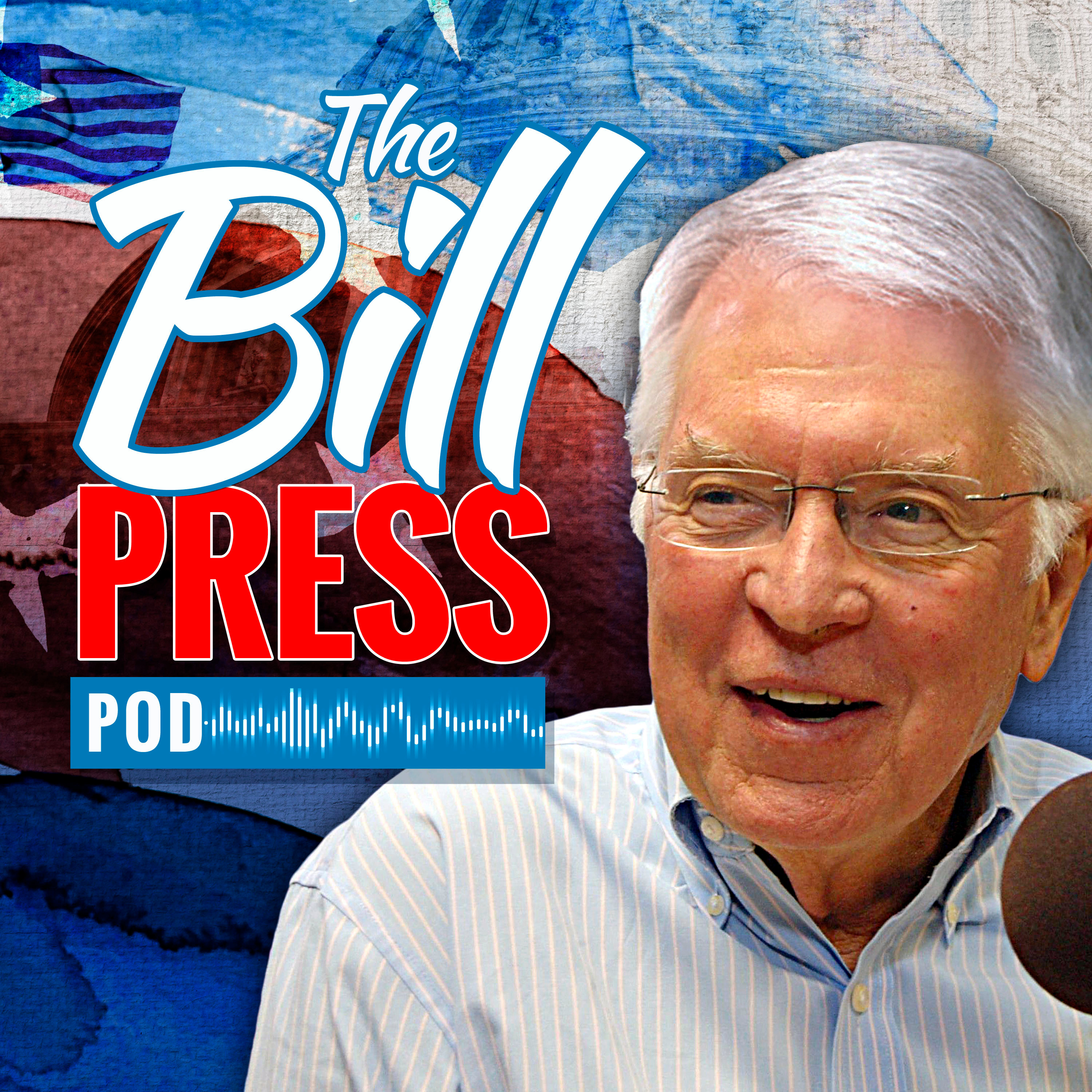
The Darrell McClain show
Independent media that won't reinforce tribalism. We have one Planet; nobody's leaving, so let’s reason together!! Darrell McClain is a Military veteran with an abnormal interest in politics, economics, religion, philosophy, science, and literature. He's the author of Faith and the Ballot: A Christian's Guide to Voting, Unity, and Witness in Divided Times. Darrell is a certified Counselor. He focuses primarily on relationships, grief, addiction, and PTSD. He was born and raised in Jacksonville, FL, and went to Edward H white High School, where he wrestled under Coach Jermy Smith and The Late Brian Gilbert. He was a team wrestling captain, District champion, and an NHSCA All-American in freestyle Wrestling. He received a wrestling scholarship from Waldorf University in Forest City, Iowa. After a short period, he decided he no longer wanted to cut weight, effectively ending his college wrestling journey. Darrell McClain is an Ordained Pastor under the Universal Life Church and remains in good standing, as well as a Minister with American Marriage Ministries. He's a Believer in The Doctrines of Grace, Also Known as Calvinism. He joined the United States Navy in 2008 and was A Master at Arms (military police officer). He was awarded several medals while on active duty, including an Expeditionary Combat Medal, a Global War on Terror Medal, a National Defense Medal, a Korean Defense Medal, and multiple Navy Achievement Medals. While in the Navy, he also served as the assistant wrestling coach at Robert E. Lee High School. He's a Black Belt in Brazilian Jiu-Jitsu under 6th-degree black belt Gustavo Machado. Darrell Trains At Gustavo Machado Norfolk under the 4th-degree black belt and Former Marine Professor Mark Sausser. He studied psychology at American Military University and criminal justice at ECPI University.
The Darrell McClain show
Secrets, Power, And Double Standards
Use Left/Right to seek, Home/End to jump to start or end. Hold shift to jump forward or backward.
A hawk who preached secrecy now stands accused of mishandling it. We open with the Bolton indictment—18 counts, thousands of pages, and a century-old Espionage Act stretched to fit modern data—and ask a hard question: can selective prosecution and real accountability coexist? We walk through the legal thresholds, the political optics, and the five flashpoints likely to define the case, from pre-trial classification fights to the quiet calculus of a plea.
From there, we pivot to Richmond, where Virginia’s attorney general race turned on a single set of violent texts. Jay Jones apologized. Jason Meyers pressed the advantage. Instead of policy, the debate became a referendum on character, forgiveness, and the limits of private speech for public office. Drawing on Virginia’s long memory—Northam, Allen, Wilder—we explore how scandal lands differently depending on narrative, tribe, and timing, and why independents in a purple state often serve as the moral jury.
Then we pull back the curtain at the Pentagon. A new policy demanded pre-approved reporting and barred even unclassified “unauthorized” information. Nearly every major outlet refused, and the Pentagon press corps dissolved for the first time since 1943. We explain why true defense reporting depends on on-the-record statements, background briefings, and off-the-record context that corrects official spin—and how gag rules don’t protect national security so much as they protect narratives. Transparency is strength; enforced silence is not.
Across these threads—Bolton’s charges, a state race with national stakes, and a historic press walkout—the theme is consistent: power resists scrutiny, and trust collapses when standards bend for the well-connected. If laws apply up the ladder, if voters set clear lines, and if the press can question without pre-clearance, legitimacy recovers. If not, we normalize secrecy, spin, and resignation. Hear the stakes, not the slogans. Subscribe, share with a friend, and tell us: where should the line be drawn?
Welcome to the Darrow McLean Show. Let's get into the show, so here we are again. Another week in America, another high-ranking official in handcuffs or at least in the headlines. This time, it's John Bolton. Yes, that John Bolton. The mustache hawk, the man who made bomb Iran sound like a foreign policy strategy, the one who strutted through the corridors of the Bush administration pushing war, then circled back under Trump as national security advisor. The man who, for decades, told the world that he, above anyone else, knew how to protect America's secrets. And now, he's the one accused of mishandling them. A federal grand jury in Maryland indicted Bolton on 18 criminal counts, eight for unlawfully transmitting national defense information, and ten for unlawfully holding onto classified documents he had no business keeping. And we're not talking about doodles or dinner menus here. The indictment says federal agents seized thousands of pages some marked top secret from his home and office. Files tied to weapon systems, intelligence sources, foreign adversary plans. The kind of material that if you or I walked out of a government building with it, we'd be in an orange jumpsuit before dinner. Each count carries up to ten years. Do the math, Bolton, age 76, could be looking at a life sentence. The skeleton in the flesh now, that's the skeleton. But skeletons are clean, almost clinical. The flesh is where the story lives. This indictment reads like a cautionary tale about ego. Bolton allegedly kept diary-like notes, more than a thousand pages, and even sent some to relatives over private email accounts. Imagine that a man who sat at the highest table of national security casually shipping off government secrets like they were Christmas letters. And to make it worse. Prosecutors say some of those accounts were hacked. If that holds up in court, it isn't just sloppy. It's reckless. But let's not pretend this is simply about carelessness. Bolton is a smart man. Too smart to accidentally walk off with boxes of top secret material, which means either he thought the rules didn't apply to him, or he was trying to preserve his legacy, his receipts, his leverage. Politics masquerading as justice or justice done right. And here's where the air gets murky, because Bolton wasn't just any bureaucrat. He became one of Donald Trump's loudest critics after leaving the White House. His book, his interviews, his testimony, all of it was designed to paint Trump as unfit, unhinged, unsafe. So when the Trump led Justice Department turns around and slaps Bolton with an indictment, you gotta pause. You gotta ask, is this justice? Or is this revenge served cold? History doesn't help. The DOJ under Trump has indicted James Comey. It has gone after Leticia James, the New York AG who dared prosecute Trump's empire. It has threatened others in the same orbit. So when Bolton's name comes up, it doesn't smell like coincidence. It smells like strategy, like intimidation. But that doesn't mean Bolton is innocent. Both things can be true. A man can mishandle secrets, a strisk be prosecuted selectively for political reasons. That's the uncomfortable space we're sitting in right now. The double standards question here's the broader tension. How do we treat powers favorites? When lower-level military analysts leak classified information, they're branded traitors. Chelsea Manning, Edward Snowden, reality winner each faced harsh punishment or exile. But when the powerful do it, when ex-presidents stash nuclear plans at a golf club, or when national security advisors ship notes to relatives, suddenly we hear talk about overclassification, gray areas, nuanced defenses, that double standard is poison. Because the public sees it, feels it, and concludes what many of us already suspect. Justice isn't blind. It peeks through the blindfold to see who's standing in front of it. The Espionage Act and the precedent, let's dig into the law for a minute. Prosecutors are leaning on the Espionage Act of 1917, a law originally meant to stop spies during World War I. Over a century later, it's being stretched and twisted to cover laptop hard drives, email servers, and diaries. The Act doesn't require proof that Bolton sold secrets to a foreign power, just that he willfully retained them without authorization. That's a low bar. Which is why civil libertarians on the left and the right are nervous. Every time the government broadens this law, it opens the door for the next official, the next journalist, even the next whistleblower to be dragged under it. So ask yourself, do we want this precedent? Do we want espionage act indictments to become routine weapons in political wars? Because once you normalize it, you can't put the genie back in the bottle. The human factor Bolton is no saint. He has spent his career cheerleading wars that kill thousands of American soldiers and tens of thousands of civilians abroad. He has brushed aside international law when it suited him. He once said the UN building in New York could lose ten stories and nobody would notice. This is a man who believed rules were for other people. And maybe that's the most American part of this story, the arrogance of power. The idea that the rules are optional if you sit high enough on the ladder. Bolton's downfall, if it comes, will not just be about illegal technicality. It will be about hubris. The same hubris that has stained so many careers before his what to watch so what happens next. Here are the five flashpoints I'm watching. Why pre-trial battles. Bolton's lawyers will fight tooth and nail over classified evidence. Expect motions about what can be revealed, what stays hidden. Two, the defense strategy. Will Bolton lee hard on the political retaliation angle? Almost certainly. And with Trump as the backdrop, that argument will resonate with millions. 3. Leaks. Don't be surprised if bits of the C's documents drip out into the press. Washington leaks like a sieve when power is on a line. 4. Judge and jury. Who presides over this case? That matters. A strict judge could box Bolton in. A cautious one might bend toward national security claims. 5. The plea question. These cases rarely go to trial. The government doesn't want sensitive evidence aired in open court. Bolton doesn't want to risk dying in prison. So will there be a deal? Why this matters beyond Bolton, let's zoom out. Because the Bolton indictment isn't just about Bolton. It's about what kind of republic we want to be. Do we want to live in a country where officials at the highest level are untouchable? Or one where justice actually reaches the loftiest offices. It's about how we handle secrecy. Our government classifies millions of documents every year, many unnecessarily. But once they're stamped top secret, they become weapons. Against whistleblowers, against enemies, against political opponents. It's about trust. If the public believes indictments are just political vendettas, then faith in the system crumbles even further. If the public believes elites can mishandle secrets with impunity, then faith crumbles too. Either way, legitimacy bleeds out. In the end, this case is a mirror. It reflects us back to ourselves. It asks, do we truly believe in accountability? Or is that just a slogan we dust off when convenient? If Bolton broke the law, he should face consequences not because he's Bolton, but because Strisku endangers national security should. If this is political revenge, then it's a disgrace not because Bolton is a saint, but because weaponized justice corrodes the republic faster than any foreign adversary ever could. So here's the paradox. Whether you cheer or jeer this indictment, the real verdict will not come from the courtroom. It will come from Stristeris' respond. Do demand fairness. Do we resist double standards? Do we stop excusing our side while crucifying the other? Because if we don't, then Bolton's case won't be an anomaly. It will be a template. And the next name and the one after that will remind us that in a republic, drifting toward decay, no one's secrets stay safe and no one's power lasts forever. Maybe that's the lesson here. The higher you rise, the heavier the fall. And when your mustache is the only part of your legacy, people remember kindly you've already lost. This week it happened again. Richmond hosted the only debate between Attorney General Jason Meyers, the Republican incumbent, and former delegate Jay Jones, the Democrat challenger. Attorney General debates in Virginia are quiet affairs. They don't move the national conversation. But this year, the stakes are enormous and the spotlight is harsh because Jay Jones is carrying a scandal into this race that simply won't die. Back in 2022, Jones sent text messages where he suggested shooting then House Speaker Todd Gilbert, a Republican. They weren't policy arguments. They weren't jokes that landed wrong. They were violent words from someone who wanted to be Virginia's top law enforcement officer. And now, in 2025, those words have come back like a ghost at the banquet. Thursday's debate wasn't about opioid settlements, sentencing reform or consumer protection, all the usual AG talking points. It was about those texts. Jones opened by apologizing, admitting it was reckless, immature, and wrong. He tied it to youthful failings, even referenced to careless driving charge the same year. He tried to do a politician's always trying to scandal, apologize fast, apologize hard, and then pivot to policy. But Meyers didn't let him. He hammered the text as proof of character. He cast Jones as fundamentally unfit. And if you watch closely, you could see the strategy stay calm, look steady, and let Jones drown in his own baggage. Here's where the weight of history presses down. Because Virginia has a strisk record of political scandals that don't stay confined to the old dominion, they ripple across the nation. Ralph Northam 2019, the Democratic governor, nearly lost his office when a yearbook photo surfaced showing him in either blackface or a clan robe. For weeks, Virginia was the butt of national jokes, the subject of oaths on race and accountability. Northam survived, but only after a prolonged apology tour and a heavy pivot to racial equity policy. The lesson. Scandals can be survived, but they scar you. Wilder's story is complicated, a breakthrough figure whose integrity was often under scrutiny. Virginia voters were reminded that history making doesn't inoculate you from scandal. George Allen, 2006. The Republican senator was cruising toward re-election until a single word macaque torched his campaign. That slur, caught on camera, ignited a firestorm about race, culture, and who Allen really was. He lost that race, and with it, his shot at the presidency. The lesson? One slip, one moment can collapse a career. Now Jay Jones enters that same lineage. His violent texts sit alongside blackface photos, racial slurs, ethical shadows, different controversies. Same question. How much grace do Virginia voters extend when scandal erupts? The double standard of forgiveness, here's the harder truth. We forgive differently depending on who's talking. Northam? Survive because Democrats rallied and voters decided policy mattered more than a yearbook photo. Alan. Crash because the macaca moment fit too neatly into a narrative about arrogance and racism. Wilder. Endured but never without suspicion. So what about Jones? He's a young black Democrat. His scandalous violent rhetoric, something Democrats usually pin on Republicans. Republicans say, look, he's unfit. Democrats counter, he apologize. Let's move forward. But forgiveness is a political calculation, not a moral one. If Jones were running in a deep blue state, maybe the apology would land. But Virginia Virginia's purple. Which means independents and suburban moderates decide the race. And independents tend not to be forgiving when violence enters the story. The fourth, what this says about us, the bigger issue isn't Jay Jones, it's us. Our political culture has normalized violent talk. From Trump saying he could shoot someone on Fifth Avenue to online threats against judges and members of Congress, the language of violence has seeped into mainstream politics. And each time we shrug a little more, Jones's texts force a confrontation. Do we draw a line in Virginia? Do we say no, you don't get to be attorney general if you once joked about shooting your political rival? Or do we say we're all human, we all make mistakes, let's look past it? That's the choice voters face. Not Mayers' platform versus Jones's platform. But whether words spoken in private disqualify you from holding power in public, VA national implications, why does this matter outside Virginia? Because the country is watching. Republicans will say if Jones wins, Democrats have no standard. They'll hammer that message in swing states. Democrats will say if Jones loses it proves the GOP can weaponize personal failings to erase policy debates. They'll claim hypocrisy, pointing to Trump's endless scandals. Either way, this down ballot race becomes national ammunition. VI lessons from the past, warnings for the future look at the patterns Tris Northam survived by shifting to racial equity policy. Driskallen lost because his scandal confirmed the worst suspicions about him. Wilder's legacy remains mixed because suspicion never left. Jones is standing at that same fork in the road. If he can redefine himself through humility and a broader policy vision, he may survive. If not, Mayers will coast to re-election, and Jones will be remembered not as a rising star but as the man who texted his career away. Closing Reflection Virginia's Mirror Virginia has always been a mirror for America, the cradle of presidents, the site of massive resistance, the testing ground for what the South becomes after the civil rights era. Now, in 2025, the mirror shows us something uncomfortable. Our tolerance for political violence, our double standards and forgiveness, our hunger for scandal, and our selective memory. If Virginians forgive Jones, it signals that apologies and growth still count in our political life. If they don't, it signals that some lines can't be crossed. Either way, the verdict will echo far beyond Richmond. The lesson from Northam Allen, Wilder, and now Jones is this in Virginia scandal never disappears. It lingers, it shapes legacies, and it forces voters to wrestle with what matters most morality, redemption, or raw partisan advantage. And that, my friends, is why a race for attorney general has become one of the most important stories in American politics this year.
SPEAKER_05:On the historic trip of Middle East peace, which uh our generation of veterans never dreamed would be possible. So you would think that the Pentagon press corps of all press corps would be front and center across the board on wanting to give credit to the president for forging this kind of peace. And instead, what they want to talk about is a policy about that, which simply says maybe the policy should look like the White House or other military installations where you have to wear a badge that identifies that you're pressed, or you can't just roam anywhere you want. It used to be, Mr. President, the press could go anywhere, pretty much anywhere in the Pentagon.
SPEAKER_09:I covered the Pentagon for six and a half years. I covered the White House for four years. I covered the Pentagon when you were there. And um we knew not to you don't walk into the tank. Uh and the classified areas are off limits. Um we obviously were always trying to get the story from different elements, and there was a freedom, but everybody had badges with them. At the White House, I never walked into the Oval Office with a situation we're on. Um, these are stipulations that essentially are changing the dynamic about how to get information and how they disseminate information.
SPEAKER_02:Yeah, I mean, uh, it it doesn't seem like the whole story is being told to our viewers here. What they're really doing, they want to spoon feed information to the journalists, and that would be their story. That's not journalism. Journalism is going out and finding the story and giving all the facts to support it. And that no one's gonna walk in and bang on the door of a four-star general or or senior civilian policy leader in the Pentagon. I never had that, but I did have journalists chasing a story of something that was going on in the Army. You know, those things are legitimate. And if anything, what would frustrate us sometimes is we didn't teach it to it. I mean something bad is happening, and we're getting our act together to do it, and sometimes, you know, well, let's wait a couple of days before we uh talk about that, and you guys are on it.
SPEAKER_09:And that's journalism. And we know the stipulations about classified information, and if there are leaks or there are situations, there are investigations many times that lead to that. But in the day-to-day, for military families for military, us being in the Pentagon is usually an asset.
SPEAKER_02:Yeah, I I have never ever seen it. I mean, when I was a four-star general, I insisted that all our new brigadier generals give a class a few days on what the role of the media is in an American democracy. These are often new generals. And then I would I wanted them to practice and give interviews and how to deal with the realities of it because they have they have all these incredible warfighting skill sets, but dealing with the media isn't one of them. And so the education of them was very important to me too that they would welcome and don't see the media as something to be intimidated by. See the media as your conduit to the American people. And that's how I always saw it and believed in supporting it. There were times when stories were done that make me flinch a little bit. Yeah, but that's usually because we had done something, it wasn't as good as we should have done it.
SPEAKER_09:Well, we're all standing in solidarity, almost all of us, and um we hope that changes. We'll see where this policy goes.
SPEAKER_04:Now, for the record, that was four-star general Jack Keane and Fox News anchor Brett Baer, a former Pentagon correspondent, as uh remember this is Fox News now, as they blasted the Defense Department's new media restrictions on Tuesday night on Fox News, calling them a threat to press freedom. The policy introduced by Defense Secretary Pete Hex, who ironically himself is a former Fox News anchor, requires journalists with the Pentagon Credential Society pledge not to obtain or use any unapproved or authorized unauthorized material, even if the information is unclassified. So let me say this in frank terms. What PKZ is trying to do is make the United States press behave like the press in North Korea. He is trying to get journalists to be state media. That in the United States of America is inappropriate. It is in fact so inappropriate that now the Pentagon no longer has a press corps for the first time in United States history. Let me say that one more time. The Pentagon no longer has a press corps for the first time in United States history because following the new restrictive rules imposed by the Defense Secretary Pete Hexek, the Pentagon Press Course has devol dissolved as of October 15, 2025. Major news outlets, including Fox News, the Associated Press, Rutters, MPR, CNN, and the New York Times refused to sign the new policy, which they argued threatened the core of journalistic uh principles and the First Amendment rights of the press. So the journalists returned their access badges and vacated their workplaces inside the building, making it the first time since the Pentagon opened in 1943 that no major news organizations have been accredited to cover the military headquarters. The only organization remaining was the people who have now decided that they will be the propaganda network for the Pentagon, the OAN. So here's the deal. And I do plan to do a uh monologue about this and write a subsec article about this. But as it stands, the Pentagon tried to force Americans, American journalists to sign a policy stating they would only publish articles that were approved beforehand by the Pentagon. And these are the organizations that rejected the Pentagon's requirements. And listen to the diversity in this so you can hear how ridiculous it is. The the the organizations that rejected the Pentagon's requirements are ABC News, Air and Space Force magazine, Al Jazeera, Al Monitor, Aviation Week, ASEO, Bloomberg News, Breaking Defense, C4IRS, NET, CBS News, CNN, Defense Daily, Defense News, Defense One, Federal Times, Fox News, Hufferton Post, Military Times, MSNBC, Newsmax, NBC News, MPR, PBS NewsHour, Political, Real Clear Politics, Rutter, Task and Purpose, USNI News, WTOP News, The Associated Press, The Atlantic, The Daily Center, The Economist, The Financial Times, The Guardian, The Hill, The New York Times, The Wall Street Journal, The Washington Post, The The Examiner, The Washington Examiner, The Washington Times, the one News Organization that said we will take marching orders from the Pentagon and report everything the Pentagon says uncritically, and as we write our articles, first give them to the Pentagon for approval, was the organization known as One American News. What a shame.
SPEAKER_08:Pentagon, uh, so that you and I can uh go off on this one. This this this has been driving me crazy. And uh Ryan, you and I both have experience. It's good to be joined by an actual former Pentagon correspondent here. Thank you, thank you, a former Pentagon correspondent. Uh one of my proudest moments, my first actual uh reporting job. So here's what's kept currently happening. Pete Heggseth and his personal lawyer, who he has hired now at the Pentagon.
SPEAKER_06:Who is sometimes suing the Pentagon? Who is sometimes suing the Pentagon? Like people understand that? Yeah. Um Pete Heggseth's personal lawyer is suing the Pentagon by working. Also working at the Pentagon. At the Pentagon. Okay.
SPEAKER_08:Um so that guy, the guy who defended him uh in rape accusations and other whatever. Um who knows uh what happened. Uh that guy and P Hex Edith have concocted new press requirements at the Pentagon, where any correspondent who works at the Pentagon has to be forced to sign a 21-page document. That 21-page document, let's put this up here on the screen, requires a couple of things. It's more complicated, but this is distilled from the Pentagon quote. Number one, the press no longer roams free. Number three, or number two, the press must wear a visible badge. Number three, credentialed press no longer are permitted to select criminal acts. Let's go through these claims one by one, because this makes sense if you're an idiot and you've never been inside of the Pentagon. All right. Number one, as I as I literally used to cover the Pentagon, you do not roam free in the Pentagon, okay? Believe it or not. It is one of the most secure buildings in the world. I used to cover the White House. The White House is 10 times less secure. I could quite literally walk into the high, like big parts of the West Wing as a reporter without ever being accosted, just over asked to open the door. If that literally opened the door, I could walk right up into the upper press area of the West Wing and be 20 feet away from the Oval Office without being asked or looked at a scan. So we can buy away from surface. Yeah. And so that's the first one, roam-free. By roam-free, what he means is that you enter the building, you go through, again, more security at the Pentagon than you do to even enter the White House. You walk past a food court, a CVS. It's like a mini building down there. It's like a city. There's like a T-Mobile store, there's a huge food court, they have like a bunch of gift shops and stuff because people are spending so much time there, there's all this stuff to do, uh, you know, for all the staff. And then you walk down a hallway and you go to the press area. Every single door is locked and it's key controlled. You cannot go into any classified area. I spent a lot of time, I never once was able to go into a classified area. The theory that he said is like, oh, well, some general could be walking down the hallway and get accosted by a drug. Didn't see it happen once. Not once. Once did I see it happen.
SPEAKER_07:The general can just keep walking.
SPEAKER_08:Also, the general can be walking. Nobody asked him to answer. Okay. Uh number two, a press must wear visible badge. Okay, uh, can we put D5 up here on the screen? I dug up this old photo of mine uh of my old badge. Okay. There it is. That badge, yes, I know. Forgive my forgive the dress shirt. It was before I knew some of the rules. I think it works. No, forget, forgive me. Whatever. That's my old badge, which I had to wear uh around my neck with one of my little lanyards everywhere that I went. Everywhere that I went. You can see very clearly the badge in front of you, the Pentagon press branded badge. Everybody, by the way, knew who the press was. Yeah, yeah, a little star in the middle of the uh the Pentagon thing. But here's the point we already had to wear a badge. That is the badge from nine years ago, because you can see it expired in August of 2017. So I got I must have gotten it sometime in August of 2016. So that's what the badge looked like whenever we were rowing around with a Pentagon. Keep in mind this is under Barack Obama, and eventually I used that badge under the new president Donald Trump. All right. So that was the Pentagon policy that was in place underneath. Now, the third thing that he claims, and this is where you and I can really go off, is quote, credentialed press are no longer permitted to solicit criminal acts. What he means by that is that by signing this document, you have to commit, you will not solicit or publish classified information. And in fact, they go even further. It doesn't just apply to classified information, because he's making a team that does, it also applies to unclassified information. So effectively, what PHF is saying is you cannot enter and cover this building if you do not print exactly what we tell you to do. That is literally what he is saying. Now, let's explain, because I actually got attacked for this. I said soliciting, encouraging people to leak is part of the job. People took that as encouraging people to leak classified information. First of all, yes, that is part of the job. And if you have it, send it over. We'd love to know. Do you like speaking rehears? Or do you like that? Yeah, do you like real information or not? Um, but second, encouraging people to leak also falls in the category of the Pentagon makes an announcement. You and I hit up people, or sometimes they hit us up, and I go, what's really going on here? They'll go, yeah, man, it's bullshit. You know, this, this, and this. And you go, oh, okay, can I cite that on background? That is not classified at all. Usually it's about clarification, some background information, some behind the scenes. He doesn't even want that to be reported because that would report on the chaos that's in the building for Mr. Hegstead. And the what galls me about this are the lies. The lie that the pet the press just roams for you all over the building. Bullshit. Literally doesn't happen. I'm telling you it doesn't happen. It's just a cover. Uh, number two, we didn't wear a badge. I just showed it to you. I had to wear it around my neck every place that we went. Couldn't even enter the building without it, literally. Um, number three, solicit information. What he would even, and I did this all the time. So here's it, I'm I know I'm in the weeds and I apologize, but the lack of transparency around this is what causes people to take this type of bullshit seriously. So what will happen is let's take this Venezuela thing in the old days when I would cover it, especially ISIS. They would call us in and they would say, we just hit a boat, you know, or we just hit an oil refinery by ISIS. We'd say, okay, and they provide an on-the-record statement, which is the official version. Then they would go on background where we could not cite them directly, and we would say, okay, so what happened here? And they're like, well, here's how we got the information, and we got this and that. And then we would ask follow-up questions. And then sometimes what you do is if you're a good Pentagon correspondent, you've got sources in Iraq or something like that. And you call them and you're like, hey man, like here's what the Pentagon is saying. And they're like, oh, that's total bullshit. Actually, it did this. And so then what you do, by the way, that would be considered a criminal act or illicitly criminal. And then what you do is you go back to them and you go, hey man, I just spoke to people familiar with the strike. They're saying what you're saying is wrong. They said it was a right part. They said Right, exactly. It was a win part. Or they said it was 50 killed as opposed to 500, right? And this happens all the time. This is the standard part of the job. And they go, Yeah, you know, yeah, you got me, right? And and and that most of the time is what it was. Or they would scream at you, which I also got uh quite a bit when I was down there. That's the job of quote soliciting information. They don't even want that. And so they've created this whole brew haha where they're trying to convince people that it's like a criminal act to solicit clarification. This is a$1 trillion budget. And the worst part is, Ryan, is even covering it, it's very hard to not be a stenographer because they so limit your access that they make it nearly impossible to print anything, which doesn't come from official channel. Unless you're really good at your job, really, really, really good, almost everything is gonna come through some official channel, which I would argue works to their benefit. Because the truth is, most of the people who cover the Pentagon are the most neocon people in the world. If you think about Barbara Starr, Glenn Greenwald used to joke that she was the Pentagon's reporter at CNN, not the CNN's reporter at the Pentagon. Or uh, what's that woman's name? Jennifer from Fox News, who's like always just repeating the pro-war with Iran line. They love having those people in the building because they have they repeat their talking points, they get sources, right? It's it's not like they're even all that antagonistic, not nearly enough for my purposes. So, yeah, I mean, all of it settles Ryan on this idea that soliciting classified information is a crime. First, no, it's not. It's actually not. But and and if somebody leaks you classified information, that's on them. But even more so, this is this is really bad because this is the first time since 1943 that there will not be a preponderance of journalists inside of that building or reporting on the Pentagon because they refused to sign their ridiculous agreement.
SPEAKER_07:Is it still only one America?
SPEAKER_08:It's only one America News.
SPEAKER_07:So the Washington Examiner said no. My former employer, the Daily Caller, Daily Collar said no, Washington Times. Fox News said no, Fox News. Pete Heggseth's former employer, Fox News. So and your proximate point that this is about covering up the chaos that is like bubbling underneath uh Pete Heggseth's leadership is key, because that's that's why specifically they're doing it here. On the classified documents and classified information, I even take a more um expansive view on that. I was interviewing Daniel Ellsberg about this once, and he made the point he's like it, it's not he's like it's not settled law that it's a criminal act to leak, even to leak classified information. It's like the First Amendment does not have a carve out for government employees. Now, you can fire a government employee, you can sanction them, you can tell them they could never work for the government again. But his argument is if you are a government employee and you see the government committing a criminal act, your First Amendment right is to speak about that and is to share information about that. Now, you could imagine carve outs or you say, well, treat well, treat he said treason is different. If you sell government information, yeah, that's a whole other to a foreign country. That's not a that's not a First Amendment protected activity. If you if if it's not newsworthy, it's not criminal, and it's and you're just um leaking like nuclear codes or whatever, like you could he would say like that does not have First Amendment protections. But newsworthy information that the public has a right to know is not even a criminal act. So even if you don't believe in that expansive of an interpretation, the idea that it's a criminal act for a journalist to call a source and say, what do you know about this airstrike? Where the Pentagon claims they killed 75 insurgents.
SPEAKER_08:And I did this every day when I covered the building. And you that's the other funny thing. These people, they hate even being questioned their official bullshit narrative. I literally got screaming. He called me a shit stirring fuck face. This was a full bird colonel, which at the time I was like 24. I was scared, right? I'm talking about a frankly fat, overweight, full bird colonel with, you know, he's got the what is it called? The oak leaf busters in that? He's like 58, and he's dressing me down because I was like, hey, I have a source telling me that what you said is incorrect. And they try to intimidate you like thugs. Like that's what they do. Like full metal jet. Yeah, it's like uh, it's a rite of passage, actually, to journalists, as learning how to how to how to deal with getting screamed at. When I talk to journalism classes, I I tell that story because I go, one day you're gonna be in that position. And they try to exploit your position in your youth, and you have to internally, it's weird getting yelled at. But my yeah, exactly. The reason they get mad is because they lied to you. That's the whole job. The job is saying, no, you're a liar, actually, this entire time. And Ryan, you've published classified information. We published the Discord leaks over here. The argument from Hegeseth and all those people, even though all the Republicans were celebrating those Discord leaks that we published showing that the Biden administration was lying about the war in Ukraine and the level of Pentagon involvement. Now they're like, oh, you're threatening national security, like you should be prosecuted. That's the argument that Obama actually wanted to make about journalists and Snowden. They wanted people like Glenn to go to jail for even reporting on that. And that's part of the thing that they threw um Chelsea Manning into prison for. I guess after eventually uh pardoning her or whatever. But the point is that that extraordinary view is now the one at the Pentagon. It's so crazy because they have banned basically all journalists from the building if they don't agree to sign, saying that they will basically not clear all the future stories with them and not even ask for clarification on their official readouts.
SPEAKER_07:Yeah, and it's hopeful that the uh all these organizations are pushing back. Um, they're siding with the fourth estate, they're signing with the First Amendment over their kind of ideological affinity. You put up um the third element here. Go check out Sagar's Twitter feed. He's lighting these people up.
SPEAKER_08:Um we'll put this guy on blast. Joel Valdez. Joel Valdez is uh deputy press secretary, former Matt Gates employee over at the Pentagon. And after one of my tweets where I said, yes, encouraging people to leak is literally a job, he says, quote, we are only enacting good policy here at the Pentagon, which I replied, here is the irony any real journalist knows. And Ryan, you're 10 times more real than I am. And you it's 99.9% of the time. The people who leak out reach out to you because they have an axe to grind. In fact, much of the time it is calm flax. Flack, by the way, is a Washington term for people like Joel, who are press assistants who don't actually know anything, um, who are the most desperate to leak on background. Those are the people, the junior press staffer is about 95% the person who's on the other end of the phone. Be like, let me offer you some stuff, context, right? Some background and for your use, so just to be able to, for your, for your ability to report. These are the phone calls, the protective things that we get. And I I encourage Joel to come out and sign a sworn affidavit that you have never leaked information before. And I also want you to say that your former boss, Matt Gates, has also never leaked information before. And that he is, in fact, not one of those people who has every reporter in this town on speed dial.
SPEAKER_07:And in fact, I'd like him to sign an affidavit that he hasn't leaked about this story. That's right.
SPEAKER_08:That's exactly what I think. I guarantee you he's leaking about this in this specific story. Trevor Burrus, Jr.: Joel, I will pay you$1,000 if you can sign a sworn affidavit saying that you've never leaked uh information. Not just classifier, any information previously in your job, including in your current role.$1,000,$1,000. Uh I'd be willing to bet.
SPEAKER_07:And it can go to uh if you can't take the money, uh charity of his choice.
SPEAKER_08:Sure. Charity of your choice. Friends of the IDF. Charity of your choice. Okay? Charity of your choice. There are a lot of different charities. We will take the YouTube revenue from this video and we will use it to we will use it to a charity. Yeah. Friends of the IDF. All you have to do is sign a sworn affidavit. That's it. That's all you have to do. Okay. Um I don't know. Anything else to say on this, Ryan?
SPEAKER_07:It's um No, I'm I'm glad you and Emily are both uh punching back uh and and the rest of the conservative press. Like that's that's what has to happen. Because this was the wet dream of Obama.
SPEAKER_08:They wanted to do it. They tried to throw Fox down to the White House press corps. Um, you know, under Obama, like I just told you, I got dressed down for questioning some of the bullshit that they were reporting on about ISIS at the time. They hated us, hated, um, you know, at the Pentagon. But they didn't ban it at the end of the day. Um, and our ability to sit there, I would argue, and actually press them a little bit, which is frankly one of the best parts of that job, is you, in many cases, you get to just question generals, which almost never happens because they'll stream in live from Baghdad. All you have to do is just show up to the room and you can just ask them a question. Like I'm talking to you right now. There's a microphone right above my head. Let's say you're coming in like via a Zoom call, and you can sit there and lob questions at these people, and most of the time, they would not try to censor you. Now, in some cases, like the Secretary of Defense or any of that, but it actually used to be one of the more open environments where, at the very least, on camera, you could question some people in power. Now, keep in mind, press Pete Hexeth secretary, has not done a press conference in four months there over at the Pentagon. And the only time they do is when after it's the Iran strike or something like that. So it's not like we're losing a ton, but it is a horrible precedent. And it is genuinely one which I think it's it's the most scary because the Pentagon, that is where all the real shit happens, right? The trillion dollars, the strikes, the most nefarious parts of the federal budget, you know, UFOs. Like the more that they try to make it so that it's all stenography, we are so much worse off. So good thing technology exists. And if you have classified information, send it over. We'd love to see it, and we will publish it.
SPEAKER_07:Last point I'd make is that transparency is a sign of strength. Yeah, I agree. And this tin pot stuff is a sign of weakness. I totally agree with you.
SPEAKER_08:I uh I actually and the irony is as of this morning, there are three stories out now about Pete Hagseth sidelining lawyers about Venezuela, Pete Hags' personal lawyer being part of this whole new media restriction, and about how that lawyer has some previous ties to Epstein, um, and about how this paranoia is part of the reason why he's being sidelined by the White House. People are still gonna leak. In fact, they're probably gonna leak more. So by the way, yeah, if that's you, right here. If you have us, reach out to us both, we'll happily publish it. Hey, if you like that video, hit the like button or leave a comment below. It really helps get the show to more people.
SPEAKER_06:And if you'd like to get the full show, ad free, and in your inbox every morning, you can sign up at breakingpoints.com.
SPEAKER_08:That's right, get the full show, help support the future of independent media at breakingpoints.com.
SPEAKER_04:It was only only a short while ago. Only a short while ago, that um my conservative friends were saying if the government doesn't have anything to hide, they would uh like transparency. Now I'm on the libertarian end of the spectrum because I'm an anarcho-syndicalist, and so the only way to be that in America is to be s uh somewhere in the libertarian perspective. Uh I am very distrustful of institutions, especially ones that can be unchallenged. And one of the most powerful ones happen to be ones that have unlimited resources. What's the unlimited resource, you ask? Taxpayer money. What's the the organization that is never, never, since I've been alive for 40 years, that is now, has never passed an audit. This Pentagon. What is the organization that as we know of, not a conspiracy theory, that has lost over a trillion dollars and it is unaccounted for. That's the Pentagon. That is the very place that the sectef uh uh sorry, military terminology, the Secretary of Defense has said, You are only allowed to report our official narrative. That is a bunch of malarky. And uh it should not be accepted, tolerated, it shouldn't even be teased. These are the same same some of the same people who when Barack Obama was the president of the United States, and targeting Glenn Greenwald and Chelsea Manning and Edit Wood Snowden and uh you know they were saying you know, this is government overreach. But this is why it's important to be consistent. When George Bush was doing it and saying, well, if they didn't have anything to hide, they would just show us the emails. They would just do this and do this and do that. And I was sitting somewhere starting to be a bit critical because I was in New York Conservative at the time, said you don't know if you have something to hide until somebody's looking through all of your stuff. And that's the truth of it. You let me and 25 of my friends bust in your home and look through your laptop and have access to your hard drive, and go over there and sift through your belongings, including your underwear drawer, and go in your bathroom and look and see what you got in there, and start interrogating your friends and your family and your pastor, and we will see how comfortable or uncomfortable each individual starts to feel. You have the right, as a matter of fact, you have the duty to question the government that you, my dear listeners, are paying for. Don't forget that. The FBI, they work for you. You in fact pay their salary. The CIA, they work for you. You do in fact pay their salary. The ATF, they work for you. You do in fact pay their salary. As unpopular as it is to say, because it's in favor on this side of the aisle and not in favor on that side of the aisle, customs and border patrol, they work for you. You in fact pay their salary. And a general an admiral they work for you. You in fact pay their salary. Your mayor works for you. Your governor works for you. Your congressman works for you. Your senator works for you. The vice president works for you. And yes, the president of the United States is a government-funded employee. He is paid by the taxpayer, and that means they work for you. They are accountable to you. Why would anybody want to concede their ability to ask questions to an unelected bureaucrat at the Pentagon who you pay to work for you? In what other capacity have you ever hired anyone? And a prerequisite of you hiring them was you don't get to ask any questions. That is a ridiculous notion. And if they could withstand the scrutiny, then you can know maybe just maybe that what they were doing was legitimate. So let's go to our blast from the intellectual past. We heard the poem yesterday from Oscar Brown Jr., the late Oscar Brown Jr., uh, the great poet, and we're going to go to another poem from Oscar Brown Jr. called The Children of Children. Beautiful poem, one of my favorite by Oscar Brown, The Children of Children. And after this, the speaking of his voice, we will be seeing you on the next episode. A lot come more, a lot more content coming. Uh you may like what I have coming next. See you on the next episode.
SPEAKER_01:The children of children, by the time they're half-grown, have habits like rabbits and young of their own. The children of children from their mama's laps hop down to the ground to be taken in traps. The children of children are trapped by dark skins to stay in and play in a game no one wins. The children of children, while still young and sweet, are all damned and programmed for future defeat. The children of children are trapped by adults who fail them, then jail them to hide the results. The children of children unable to cope with systems that twist them and rob them of hope. The children of children of sin and the shame keep pairing and bearing, and who do you blame? The children of children cry out every day. They beg you for rescue, and what do you say?
Podcasts we love
Check out these other fine podcasts recommended by us, not an algorithm.

The LUNSB Show with T-Bone and ChickBrew
Tony Knuckles
Over opinionated with Josh Scott
Josh scott
Don't Be Mad: A Podcast with Jamie and Abby!
Jamie Kilstein
The Back Row with Jamie Kilstein
Jamie Kilstein
Your Calvinist Podcast with Keith Foskey
Keith Foskey
BJJ Mental Models
Steve Kwan
Renewing Your Mind
Ligonier Ministries
The Hartmann Report
Thom Hartmann
The Glenn Show
Glenn Loury
#RolandMartinUnfiltered
Roland S. Martin
Newt's World
Gingrich 360
Ralph Nader Radio Hour
Ralph Nader
Bannon`s War Room
WarRoom.org
Bannon’s War Room
dan fleuette
The Young Turks
TYT Network
The Beat with Ari Melber
Ari Melber, MS NOW
The Damage Report with John Iadarola
TYT Network
The Majority Report with Sam Seder
Sam Seder
The David Pakman Show
David PakmanGet A Grip with Kendall Reusing
Kendall Reusing
Ultimately with R.C. Sproul
Ligonier Ministries
Grace to You: Radio Podcast
John MacArthur
The Briefing with Albert Mohler
R. Albert Mohler, Jr.
StarTalk Radio
Neil deGrasse Tyson
The Bill Press Pod
BP Pods
Ask Pastor John
Desiring God
The Weekly Show with Jon Stewart
Comedy Central
Ask Ligonier
Ligonier Ministries
Lost Debate
The Branch
Coffee-Time-Again
Dale Hutchinson
5 Minutes in Church History with Stephen Nichols
Ligonier Ministries
The Ezra Klein Show
New York Times Opinion
Why Is This Happening? The Chris Hayes Podcast
MS NOW, Chris Hayes
Changed By Grace
PodPoint
The Benjamin Dixon Show
The Benjamin Dixon Show
Thinking in Public with Albert Mohler
R. Albert Mohler, Jr.
Who Killed JFK?
iHeartPodcastsThe MacArthur Center Podcast
The Master's Seminary
Jean Jacques Machado : No Gi Required
Jay Zeballos
Trauma Bonding
Jamie Kilstein
This Day in History
The HISTORY Channel
The Ben Shapiro Show
The Daily Wire
The Sean Hannity Show
Sean Hannity
Breaking Points with Krystal and Saagar
iHeartPodcasts
The Kyle Kulinski Show
Kyle Kulinski